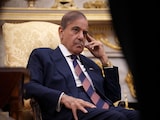China Foreign Minister Wang Yi met his counterpart S Jaishankar in Delhi Monday evening and will meet Prime Minister Narendra Modi later, hinting at a potential reset of fractured ties between two of the world's largest economies as they navigate being bashed by US President Donald Trump's trade tariffs.
Mr Yi's visit signals the resumption of top-level Delhi-Beijing contact - this is his first visit to India in three years - a resumption to be cemented by the Prime Minister's trip August 31-September 1 trip to China's Tainjin for another meeting of the Shanghai Cooperation Organisation.
Wang Yi's visit to India and the PM's China trip are significant from a border and regional security standpoint. Any peaceful resolution to long-standing disputes in Ladakh and Arunachal Pradesh, and any step towards a less geopolitically volatile Eurasia, will be widely welcomed.
The Chinese minister's visit is expected to help restart not just frozen border dispute resolution mechanisms, but also more important people-to-people contact like visas and direct flights stopped in the early days of the Covid pandemic and kept on hold after the violence in Ladakh.
The Tariff Background
Donald Trump's tariffs had an effect the American President may not have expected. Ties between India and China, finding themselves in similar predicaments, began thawing.
In March, shortly after Mr Trump doubled tariffs on China to 20 per cent, Mr Yi called on Delhi and Beijing to work together and "take the lead in opposing hegemonism and power politics".
"... making the 'elephant' and 'dragon' dance together is the only right choice," the Chinese leader said then, "Supporting, instead of wearing each other down, and strengthening cooperation, instead of guarding (against) each other, is in our fundamental interests."
Fast-forward five-six months. The 'elephant' and the 'dragon' haven't quite taken to the dance floor, but the intent is still there, even if the choreography has not been worked out so far.
China, however, has made it clear it intends to pursue this path.
In July Chinese Vice President Han Zheng said 'becoming partners that enable each other's success and achieving the "dragon-elephant tango" is the right choice for both sides.
And last week the Global Times, a Chinese government mouthpiece, referred to a 'ballet dance between dragon and elephant' as it called for a joint pushback against Trump's tariffs.
The bonhomie hasn't been one-sided. In March the Prime Minister spoke to US-based podcaster Lex Friedman and said normalcy had returned to the India-China border.
"Our focus is to ensure these differences don't turn into disputes. Instead of discord, we emphasise dialogue, because only through dialogue can we build a stable, cooperative relationship that serves the best interests of both nations."
China welcomed the statement and said again, "cooperation is the right choice."
The Pakistan Angle
But for complete India-China cooperation to happen, the Pakistan issue needs to be resolved.
Beijing continues to back Islamabad, particularly in the context of the war on terrorism.
In May, for example, it reportedly blocked a United Nations Security Council proposal to label five Pak-based Lashkar-e-Taiba and Jaish-e-Mohammad individuals as 'global terrorists'.
There was also a difficult moment in a SCO summit meet in June. Defence Minister Rajnath Singh refused to sign a joint statement there because it did not mention the Pahalgam attack.
READ | India Snubs SCO Text That Skipped Pahalgam, Had Balochistan
Worse, the document tacitly accused India of creating unrest in Pak's Balochistan province.
This was reportedly done at Pakistan's behest.
For India-China ties to be reset, both the border dispute and China's continuing support of Pakistan will have to be addressed. That could take time. But, till then, cooperation on multilateral platforms like the SCO and BRICS - to offset Trump's tariffs and benefit both economies will be a step forward.
Mr Jaishankar made that point in July when he was in Beijing.
READ | China's "Dragon-Elephant Tango" Call As S Jaishankar is In Beijing
"Our bilateral relationship, as you have pointed out, has been steadily improving since the meeting between Prime Minister Modi and President Jinping in Kazan last October...I am confident my discussions in this visit will maintain that positive trajectory," he said in televised remarks.















